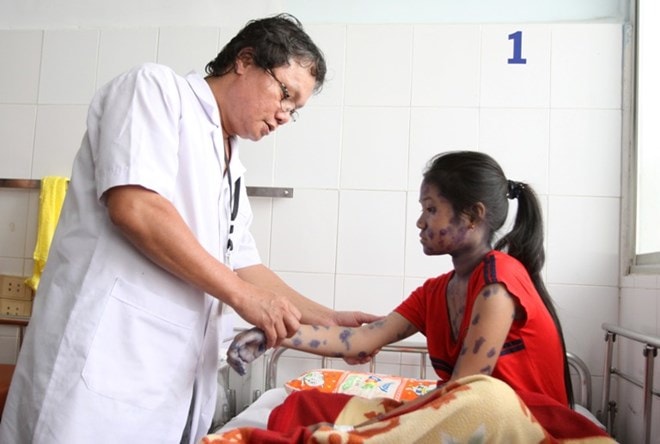The North is entering the peak of the chickenpox epidemic.
Bach Mai Hospital has received and treated hundreds of adult cases of chickenpox, and also dozens of cases with complications such as infected blisters, pneumonia, encephalitis...
According to information from the Department of Preventive Medicine (Ministry of Health), the number of chickenpox cases each year is high almost throughout the country.
In 2017, the country recorded nearly 40,000 cases, an increase of nearly 50% compared to 2016.
The number of patients started to increase from January, peaking in March with 8,000 cases while the average number of patients in the months was below 3,000.
Severe complications of pneumonia
Health experts warn that the North is entering the peak of the chickenpox epidemic due to the prolonged cold weather. Although it is a benign infectious disease, if the chickenpox patient has an underlying immunodeficiency disease, it can have serious complications such as pneumonia and even death.
During this winter-spring season, the Department of Infectious Diseases (Bach Mai Hospital) received and treated hundreds of adult cases of chickenpox, and also dozens of cases with complications such as infected blisters, pneumonia, encephalitis, etc. Cases with complications of pneumonia and encephalitis have a high risk of death.
Bach Mai Hospital is treating a female patient with severe pneumonia complications after contracting chickenpox, which is at high risk of death.
Patient BTMH (27 years old, in Son Duong, Tuyen Quang) has a history of systemic lupus erythematosus for 7 years and is an inpatient at the Center for Allergy and Clinical Immunology.
The patient also had Raynaud's syndrome, had 4 finger joints amputated on both sides, and necrosis of the 4th and 5th toes on the left side that had not been amputated.
On March 1, the patient was transferred to the Department of Infectious Diseases with a fever on the second day and a rash of blisters scattered on the forearms and trunk.
Just one day later, the patient had difficulty breathing, had difficulty breathing, coughed less, and was physically exhausted...
X-rays and tests showed that the patient had severe pneumonia complications after chickenpox, on the background of systemic lupus erythematosus/acronecrosis. The patient is being treated intensively, requiring oxygen, but the prognosis is very cautious.
Do not be subjective when sick
Dr. Do Duy Cuong - Head of the Department of Infectious Diseases (Bach Mai Hospital) said that chickenpox is an infectious disease, transmitted through the respiratory tract, commonly found in children. However, adults who have not contracted the disease when in contact with sick people or patients with a history of systemic autoimmune diseases are also susceptible to infection and tend to have more severe symptoms than children.
The disease usually occurs sporadically throughout the year, but appears more often in the winter and spring and has a benign course, can heal itself after about 1-2 weeks. In patients with special constitutions such as immunodeficiency, complications can occur, mild is skin infection where blisters appear, more severe can cause pneumonia, encephalitis...
Dr. Cuong also said that currently there is a specific treatment for chickenpox virus called Acyclovir, but early treatment is needed. It is important for patients to monitor and promptly detect complications, maintain hygiene and avoid self-medication with drugs that can make the disease worse, such as corticosteroids...
People with chickenpox who have blisters that are cloudy and not clear, have a bacterial infection. Children with chickenpox who have a cough, increased fever, headache, vomiting, or are more lethargic... need to go to the hospital to avoid life-threatening complications.
The World Health Organization recommends that for chickenpox, vaccination is the simplest and most effective way to prevent the disease for yourself and the community.
Women should be vaccinated before becoming pregnant; they should not be vaccinated while pregnant.
Children aged one to 12 years only need one dose of vaccine to prevent chickenpox. Those aged 13 and older need two doses given at least six weeks apart./.


